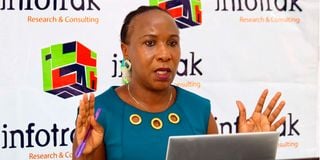Premium
Poll: Most Kenyans believe country is on the wrong track

Infotrak Research and Consulting CEO Angela Ambitho addresses journalists as she releases the results of an opinion poll on the country’s economic performance at the company’s offices on Jacaranda Avenue in Nairobi yesterday.
What you need to know:
- Only 30 per cent of Kenyans believe the country is on the right track, with 13 per cent unsure.
- People in Nairobi (61 per cent), Western (68 per cent) and Nyanza (67 per cent) were most dissatisfied.
More than half of Kenyans (53 per cent) say the country is headed in the wrong direction barely a year after President William Ruto took office, a new opinion poll has revealed.
The survey, conducted by Infotrak Consulting between August 21 and September 10, also gave President Ruto's performance a 55 per cent approval rating, while that of his deputy Rigathi Gachagua was 47 per cent.
Majority of Kenyans (65 per cent) said the rising cost of living should be an issue of priority for the Kenya Kwanza government.
Only 30 per cent of Kenyans believe the country is on the right track, with 13 per cent unable to say whether the country is on the right or wrong track and three per cent saying they do not know. Kenyans living in Nairobi (61 per cent), Western (68 per cent) and Nyanza (67 per cent) were most dissatisfied with the government, compared to those in Central and North Eastern (40 per cent each), who said Kenya was on the right track.
According to Ms Angela Ambitho, the Chief Executive Officer of Infotrak, the latest opinion poll points to a trend where a number of Kenyans who believed in President Ruto’s bottom-up ideology feel let down by the government.
“From the survey we conducted, Kenyans are saying that this is a government that was elected to help the hustlers (poor people), but that has not been the case,” said Ms Ambitho, adding,
“Most Kenyans are complaining that they cannot afford basic needs and that public education, which is supposed to be free, is becoming unaffordable for them.”
Those living in the Rift Valley rated President Ruto’s performance as good (60 per cent) while those in Western and Central regions gave it an average rating of 58 per cent.
Those who believe the country is heading in the right direction cited the existing peace and harmony as one of the factors. Half of President Ruto's cabinet was also given a performance grade of D, indicating that they have a tough task ahead of them in fulfilling the government's manifesto.
In terms of performance, Interior Cabinet Secretary Kithure Kindiki was rated as the best performer with 59 per cent, followed by his Education counterpart Ezekiel Machogu (55 per cent).
The third-best performing cabinet secretaries were Transport’s Kipchumba Murkomen (53 per cent), Agriculture’s Mithika Linturi (53 per cent) and Health’s Susan Nakhumicha (53 per cent).
Those who were rated as having an average performance were Aden Duale (Defence), Ababu Namwamba (Sports), Eliud Owalo (ICT), Alfred Mutua (Foreign Affairs), Penina Malonza (Tourism) and Alice Wahome (Water). The rest of the cabinet secretaries are in the red with a rating of D.
Ms Ambitho explained that some Kenyans are not aware of what some of the cabinet secretaries have achieved since they took office.
"The cabinet secretaries' grades depended on the ability of Kenyans to be familiar and have knowledge of what they are doing to serve Kenyans. There are some Kenyans who said they do not know or cannot remember what some cabinet secretaries have done since they came into office, hence they were rated poorly," she added.
The survey was conducted using Computer Assisted Telephone Interviews and involved a total of 4,000 respondents with a response rate of 96 per cent and a margin of error of ±1.55 per cent at the 95 per cent confidence level. The majority of respondents (56 per cent) were aged between 18 and 35.





